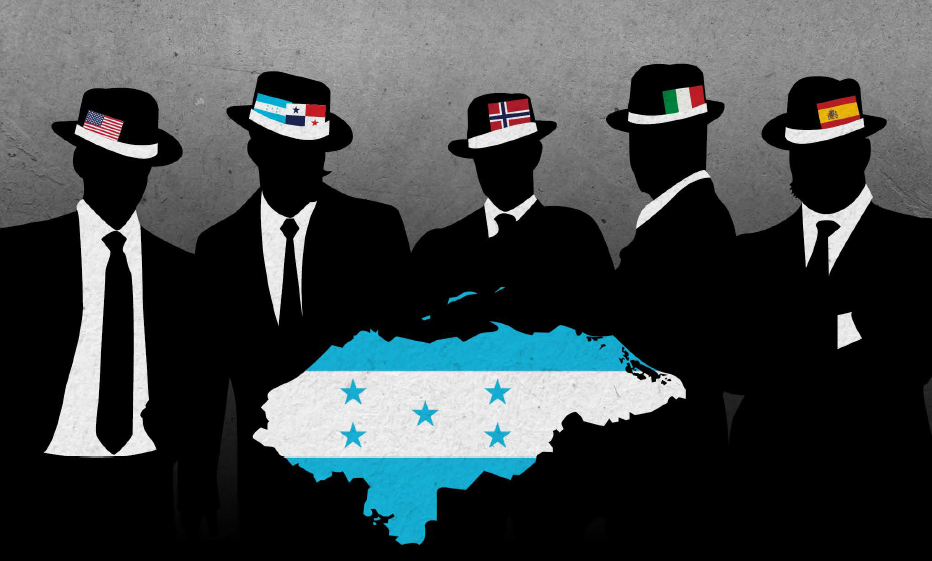‘Mafia investments against Honduras’. New report exposes corporate demands after coup d’état
Toutes les versions de cet article : [English] [Español] [français]
by bilaterals.org | October 2024
‘Mafia investments against Honduras’. New report exposes corporate demands after coup d’état
A new report, "The corporate assault on Honduras", examines the worrying situation in which the Central American country finds itself in the face of claims brought by transnational corporations before international arbitration tribunals. The analysis, carried out by the Institute for Policy Studies (IPS), the Honduras Solidarity Network (HSN), Terra Justa and the Transnational Institute (TNI), shows how investments made during the narco-dictatorship following the 2009 coup d’état have triggered an avalanche of multi-million dollar lawsuits in recent years.
An alarming picture
Since the 2009 coup, Honduras has been the subject of nineteen requests for international arbitration. Between 2023 and August 2024 alone, Honduras received fourteen requests from the World Bank’s International Centre for Settlement of Investment Disputes (ICSID). The scale of these claims is alarming, as they relate to investment projects that were mostly irregularly implemented during the narco-dictatorship, in an environment marked by corruption and human rights and environmental violations.
What the companies behind these lawsuits have in common is that their investments have met with resistance from local communities, who have denounced the dispossession of their land, the contamination of their natural resources and the attack on their food sovereignty. Today, however, these same companies are using the Investor-State Dispute Settlement (ISDS) mechanism to demand millions of dollars in compensation, thereby hampering the Honduran state’s ability to act in the name of citizenship.
Parallel justice and multimillion-dollar lawsuits
The ISDS mechanism in investment and trade treaties allows foreign companies to bypass national courts and go directly to international arbitration tribunals. This system, known as ’parallel justice’, has made it easier for corporations to exert pressure on public policy in Honduras, freezing essential regulations in areas such as human rights, the environment and public welfare.
Among the most expensive lawsuits is one filed by Honduras Prospera Inc, which is seeking more than $10.775 million to stop the government’s efforts to abolish the Zones for Employment and Economic Development (ZEDE). This amount is almost three times the public investment plan approved for 2024. Although Prospera does not meet the legal requirements to develop a ZEDE, it is lobbying the government to allow it to continue in the country.
Impact on public policy
Lawsuits brought by investors not only affect the finances of the Honduran state, but also seek to influence public policy, a phenomenon known as the ’chilling effect’ or ’regulatory freeze’. For example, many of these lawsuits are aimed at slowing down the current government’s efforts to take over the national electricity company (ENEE) or to regain control of airport infrastructure, among other things.
In addition, energy and mining projects strongly opposed by local communities continue to deprive people of vital resources. The ’Los Prados’ solar energy project, developed by Norwegian investors, is a good example. It is opposed by local communities concerned about the impact on their water resources and food sovereignty. The companies involved have filed two lawsuits seeking a total of $400 million.
Honduras and ICSID : a first step towards reform
In February 2024, Honduras took an important step by withdrawing from ICSID, the main arbitration forum for settling disputes between investors and governments. But while this decision is crucial, it is not enough. Honduras remains exposed to corporate claims due to its participation in numerous investment and free trade agreements, as well as the 2011 Investment Law, which grants undue privileges to foreign investors.
The report stresses that withdrawing from ICSID must be accompanied by a thorough review of national legislation, international treaties and contracts to ensure that the country does not continue to be subject to a system that favours corporations over the rights of the Honduran people.
Recommendations for a sovereign Honduras
The report concludes with a series of recommendations for Honduras to move towards a more just and equitable development model that is not subservient to corporate interests :
1. Review of international treaties : The free trade and investment protection treaties that allow transnational corporations to sue the Honduran state in international tribunals must be evaluated and reformed.
2. Strengthening the national judiciary : The state must strengthen its national judicial and regulatory systems to ensure that disputes are resolved within the framework of Honduran law, without recourse to international forums favourable to corporations.
3. Support for affected communities : Social movements and affected communities must be supported in their struggle against extractive and energy projects that threaten their wellbeing and their right to territory.
4. Building a national coalition : It is essential to build a non-partisan coalition that brings together social movements, communities and other sectors of Honduran society to confront the investment protection system and current and future demands.
This report was written and published by a team from the Institute for Policy Studies (IPS), the Transnational Institute (TNI), Terra Justa and the Honduras Solidarity Network (HSN) : Luciana Ghiotto, Jen Moore, Aldo Orellana López, Karen Spring and Manuel Pérez Rocha.






